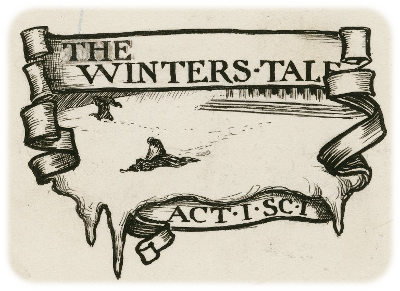The Winter’s Tale
Act I, Scene 1

Sicilia. An antechamber in Leontes’ palace.
- Enter Camillo and Archidamus.
Archidamus
1 - 4- If you shall chance, Camillo, to visit Bohemia on the like
- occasion whereon my services are now on foot, you shall see
- (as I have said) great difference betwixt our Bohemia and
- your Sicilia.
Camillo
5 - 6- I think, this coming summer, the King of Sicilia means to
- pay Bohemia the visitation which he justly owes him.
Archidamus
7 - 8- Wherein our entertainment shall shame us: we will be
- justified in our loves; for indeed—
Camillo
9- Beseech you—
Archidamus
10 - 14- Verily, I speak it in the freedom of my knowledge: we cannot
- with such magnificence—in so rare—I know not what to say—We
- will give you sleepy drinks, that your senses (unintelligent
- of our insufficience) may, though they cannot praise us, as
- little accuse us.
Camillo
15- You pay a great deal too dear for what’s given freely.
Archidamus
16 - 17- Believe me, I speak as my understanding instructs me, and as
- mine honesty puts it to utterance.
Camillo
18 - 28- Sicilia cannot show himself overkind to Bohemia. They were
- train’d together in their childhoods; and there rooted
- betwixt them then such an affection, which cannot choose but
- branch now. Since their more mature dignities and royal
- necessities made separation of their society, their
- encounters (though not personal) hath been royally
- attorney’d with interchange of gifts, letters, loving
- embassies, that they have seem’d to be together, though
- absent; shook hands, as over a vast; and embrac’d as it were
- from the ends of oppos’d winds. The heavens continue their
- loves!
Archidamus
29 - 32- I think there is not in the world either malice or matter to
- alter it. You have an unspeakable comfort of your young
- prince Mamillius: it is a gentleman of the greatest promise
- that ever came into my note.
Camillo
33 - 36- I very well agree with you in the hopes of him; it is a
- gallant child; one that, indeed, physics the subject, makes
- old hearts fresh. They that went on crutches ere he was born
- desire yet their life to see him a man.
Archidamus
37- Would they else be content to die?
Camillo
38 - 39- Yes; if there were no other excuse why they should desire to
- live.
Archidamus
40 - 41- If the King had no son, they would desire to live on
- crutches till he had one.
- Exeunt.






